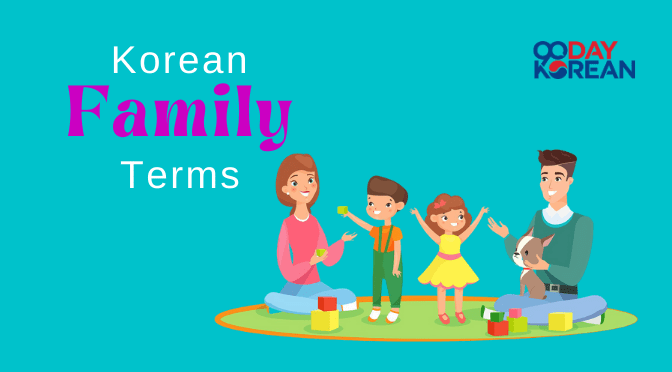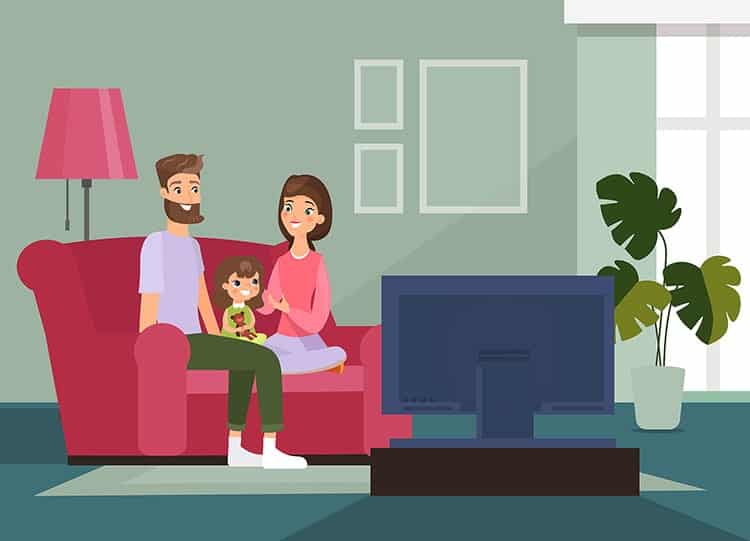How To Say Little Brother In Korean
Korean family terms are very important in Korea. It may come in handy during your vacation when y'all run into different people especially if you're living there for a period of fourth dimension every bit the topic of family is bound to come up.
At that place are quite a few different family terms in Korean for you to acquire. That is because Koreans oftentimes use titles instead of names to prove respect. These family terms demonstrate the social and family hierarchy.
In this guide, nosotros'll show y'all exactly what each family unit term ways and how to utilize information technology.

Below is a free PDF guide that yous tin can download and take with yous:
Contents
- one Family Members in Korean
- ii Family in Korean
- 2.1 Sister in Korean
- two.2 "Younger sis" in Korean
- 2.iii Brother in Korean
- 2.4 "Younger blood brother" in Korean
- 3 Parents in Korean
- 3.ane Father in Korean
- 3.2 Mother in Korean
- 4 Korean terms for father'southward side of the family
- five Korean terms for mother'southward side of the family
- 6 Korean terms for married couples to utilise with each other
- 6.1 Married woman in Korean
- 6.2 Mother in law in Korean
- 6.three Father-in-law in Korean
- 6.4 Sister-in-law in Korean
- 6.5 Brother-in-police in Korean
- vii Relatives in Korean
- 8 "Uncle" in Korean
- viii.1 Uncle in Korean (Male parent's side)
- viii.ii Uncle in Korean (Mother's side)
- 9 "Aunt" in Korean
- 10 How Many People Are in Your Family unit?
- eleven A discussion of caution about Romanization
Family Members in Korean
These are the terms that you volition admittedly need to learn to discuss family unit with your new Korean-speaking friends and contacts. Yous'll speedily find yourself using at least 1 of these words every twenty-four hours! Whether you are talking with or nigh your family, or with others, yous can employ the aforementioned words.
| English | Korean |
|---|---|
| Family | (gajok) |
| Father | (abeoji) |
| Dad | (appa) |
| Female parent | (eomeoni) |
| Mom | (eomma) |
| Parents | (bumonim) |
| Grandparents | (jobumonim) |
| Grandfather | (harabeoji) |
| Grandmother | (halmeoni) |
| Big blood brother (if you lot are a boy) | (hyeong) |
| Large blood brother (if you are a girl) | (oppa) |
| Big sister (if you are a boy) | (nuna) |
| Big sister (if y'all are a girl) | (eonni) |
| Younger sibling | (dongsaeng) |
| Younger blood brother | (namdongsaeng) |
| Younger sister | (yeodongsaeng) |
| Brothers | (hyeongje) |
| Sisters | (jamae) |

Family in Korean
Earlier nosotros deep swoop into each family term in Korean, nosotros should too know the Korean word for "family." The word family in Korean is 가족 (gajok).
The first part of the discussion, "가 (ga)", often appears in other words related to family unit, such equally 가정 (gajeong), which is a less commonly used give-and-take for "family unit", or in restaurant names such every bit 유가네 (yugane), which would translate as "Yoo family". Knowing the meaning of different parts of words can help you abound your vocabulary very quickly.
If you want to say "my family", and then instead of using 제 (je) or 내 (nae) for my, y'all can use 우리 (uri). Usually, 우리 (uri) means "our", but information technology tin hateful "my" when referring to your family.
Sample Sentences:
가족끼리 여행 중이에요. (gajokkkiri yeohaeng jungieyo)
We are travelling as only a family.
저는 가족들과 함께 경주에 갔어요. (jeoneun gajokdeulgwa hamkke gyeongjue gasseoyo)
I went to Gyeongju with my family.
그 파티에 가족도 초청할 거야? (geu patie gajokdo chocheonghal geoya)
Will you invite your family to the party?
If yous desire to learn how to build your ain Korean sentences, we have a resource to help you learn the basic Korean sentence structure.
Sister in Korean
In that location are unlike ways to say "sister" in Korean. It depends on the gender of someone addressing i's sister. For males, an older sister is addressed every bit 누나 (nuna). For females, an older sister is called 언니 (eonni).
누나 (nuna) and 언니 (eonni) can also be used when talking nearly 1's older sister to others. These can also be used when talking about or addressing an older sister non related to you just with whom y'all have a close human relationship.
Beneath are sample sentences for "sister" in Korean:
나에게는 누나 한 명이 있어요. (naegeneun nuna han myeongi isseoyo.)
I have an older sister.
언니는 나보다 10살이 많아요. (eonnineun naboda 10sari manayo.)
My sister is ten years older than me.
Check out the video below to acquire more about the discussion Unnie (언니).
What does the Korean word "unnie" (언니 | eonni) mean?
"Younger sis" in Korean
A younger sister in Korean is 여동생 (yeodongsaeng). This word is used when you're talking about your younger sister to others. It is used regardless of your gender.
In add-on, the general term for "sister" in Korean is 자매 (jamae).
Blood brother in Korean
Similar to "sister", the Korean word for brother is also dependent on who's addressing the brother. For males, 형 (hyeong) is used to address an older brother in Korean while for females, 오빠 (oppa) is used. Both 형 (hyeong) and 오빠 (oppa) are too used when referring to one's older blood brother to others.
Here are sample sentences for "brother" in Korean:
형은 소파에 잠깐 누웠어요. (hyeongeun sopae jamkkan nuwosseoyo.)
My blood brother lay down on the sofa for a while.
우리 오빠는 대학생이에요. (uri oppaneun daehaksaengieyo.)
My brother is a college student.
"Younger blood brother" in Korean
A younger brother in Korean is 남동생 (namdongsaeng). This word is used by both males and females when talking nigh one'south younger brother.
The general term for "blood brother" is 형제 (hyeongje).
Parents in Korean
The word parents in Korean is 부모 (bumo). However, you'll use the word 부모님 (bumonim) if you're talking almost your parents to others. Adding the honorific title 님 shows respect to your parents when you talk about them.
Father in Korean
Father in Korean tin can be expressed in 2 ways. I mode to call or address your begetter is 아버지 (abeoji). You can as well use this when talking about your begetter to others.
Some other way to call or address your father in Korean is 아빠 (appa). This word means "dad" in English language.
Mother in Korean
Female parent in Korean can be expressed in ii means, like to male parent in Korean. One style to call or address your mother is 어머니 (eomeoni). This can also be used when talking about your mother to others.
The 2nd way to express female parent in Korean is 엄마 (eomma). This discussion means "mom" in English.
Korean terms for father'due south side of the family
The next ii sections may be more challenging for you to learn every bit at that place are many new terms to memorize. Still, some of these words may come in surprisingly handy to know. In this section, we will go over terms that are specific to times when yous are speaking of your father's side of the family unit.
| English | Korean |
|---|---|
| Male parent's side of the family unit | (chinga) |
| Male parent's older brother | (keunappa), (baekbu) |
| Father's older blood brother'southward wife | (keuneomma), (baengmo) |
| Begetter's younger brother | (jageunappa) |
| Father's younger brother's wife | (jageuneomma) |
| Father'southward unmarried younger brother | (samchon), (sukbu) |
| Father'due south sister | (gomo) |
| Father's sister'due south husband | (gomobu) |
Korean terms for female parent's side of the family
Much similar the above-mentioned terms for your father's side of the family unit, these terms are but used when you want to talk about your mother'due south side. Talking well-nigh your male parent's and mother'southward sides of the family may not be a daily topic for you, merely these are incredibly useful words to know.
| English language | Korean |
|---|---|
| Female parent's side of the family | (oega) |
| Maternal grandfather | (oeharabeoji) |
| Maternal grandmother | (oehalmeoni) |
| Mother's blood brother | (oesukbu) |
| Mother's blood brother's married woman | (oesungmo) |
| Mother's sister | (imo) |
| Mother'due south sister'south husband | (imobu) |
Korean terms for married couples to use with each other
Unless you ally a Korean or conversation a lot with someone who is married to a Korean, the following section may non be of great importance to you. Even so, if you do intend to marry a Korean or i of your best friends is married, you will desire to know this vocabulary and be able to use it. Some vocabulary changes depending on the state of affairs they are existence used in, and in those cases, we take fabricated a note abreast the word.

| English | Korean |
|---|---|
| Hubby | (nampyeon) |
| Married woman | (buin) |
| In-laws | (sadon) |
| Father-in-police (husband'due south side) | (abeonim), (siabeoji) |
| Begetter-in-police (wife's side) | (jangin) |
| Mother in law (hubby's side) | (eomeonim), (sieomeoni) |
| Mother-in-law (wife's side) | (jangmonim) |
| Brother-in-police force (husband's side, older brother) | (ajubeonim), (hyeongnim) |
| Brother-in-police (husband'south side, younger brother) | (sidongsaeng) |
| Blood brother-in-police (hubby's side, younger, married, addressed straight) | (seobangnim) |
| Brother-in-law (husband'south side, younger, unmarried, addressed direct) | (doreyonnim) |
| Husband's older brother's wife | (hyeongnim) |
| Husband's younger blood brother's wife | (dongseo) |
| Brother-in-law (married woman'south side, older blood brother) | (hyeongnim) |
| Brother-in-law (married woman's side, younger brother) | (cheonam) |
| Wife's older brother'southward married woman | (ajumeonim) |
| Wife's younger blood brother's wife | (cheonamdaek) |
| Sister-in-police (married man's side, older sister) | (hyeongnim), (eonni) |
| Sister-in-constabulary (husband's side, younger sister) | (dongseo), (agassi) |
| Sister-in-law (wife's side, older sister) | (cheohyeong), (hyeongnim) |
| Sister-in-law (wife'due south side, younger sis) | (cheoje) |
| Husband's older sister's husband | (seobangnim) |
| Husband'southward younger sis's husband | (seobangnim) |
| Wife'southward older sis's husband | (hyeongnim) |
| Married woman's younger sister's husband | (dongseo) |
| Married man (when talking about him with other people) | (juin), (bakkatyangban), (juinyangban) |
| Husband (when talking nearly him with adults with children) | (aebi) |
| Wife (when talking well-nigh her to non-relatives) | (anae) |
| Married woman (when talking about her with other people) | (ansaram) |
| Wife (when talking virtually her with adults with children) | (emi) |
Wife in Korean
The word wife in Korean is 부인 (buin). All the same, in that location are other words you'll use when talking virtually your wife to others. There are the words 아내 (anae), 안사람 (ansaram) and 에미 (emi). Beneath are instance sentences on their usage:
애미 말을 잘 들어라. (aemi mareul jal deureora)
Mind to your female parent.
안사람은 지금 친정에 있습니다. (ansarameun jigeum chinjeonge itseumnida)
My married woman is at her parents right at present.
부인께서는 요즘 어떻게 지내십니까? (buinkkeseoneun yojeum eotteoke jinaesimnikka)
How is your married woman doing these days?
아내가 어제 아들을 낳았어요. (anaega eoje adeureul naasseoyo)
My wife gave birth to a son yesterday.
Mother in law in Korean
The Korean term for mother-in-law can exist expressed in a number of ways. The term or title used to address mother-in-police force in Korean depends on which side of the family she belongs to. Female parent-in-law in Korean for the hubby's side is called 어머님 (eomeonim) or 시어머니 (sieomeoni). On the other hand, for the wife's side, it's 장모님 (jangmonim).
Father-in-law in Korean
Similarly, father-in-constabulary in Korean too depends on the side of the family he belongs to. If he belongs to the hubby's side, the father-in-police force is called 아버님 (abeonim) or 시아버지 (siabeoji). While he is called 장인 (jangin) on the married woman's side.
Sister-in-law in Korean
Just like sister in Korean, there are unlike terms for sister-in-constabulary depending if she'due south the older or younger sis. First, for the husband's side, 형님 (hyeongnim) and 언니 (eonni) is used to address the older sister, while 동서 (dongseo) and 아가씨 (agassi) are for the younger sister. For the wife's side, the older sis-in-police is addressed as 처형 (cheohyeong) or 형님 (hyeongnim), while the younger sister-in-police is 제 (cheoje).
Additionally, if you're a guy, you lot tin can telephone call your younger brother's married woman as 제수 (jesu) and 올케 (olke) if you lot're a girl. If you have an older brother who's married, you tin call his married woman 형수님 (hyeongsunim) if you lot're a guy. If you're a girl, yous tin can call your older brother'southward wife as 새언니 (saeeonni).
Blood brother-in-police force in Korean
Addressing your brother-in-police in Korean is a bit more than complex. On the husband'southward side, you call him 아주버님 (ajubeonim) or 형님(hyeongnim) if he's the older brother. If he's younger, you can phone call him 시동생 (sidongsaeng). However, a younger brother-in-law can too exist addressed equally 서방님 (seobangnim) if he'due south married and 도련님 (doreyonnim) if he's unmarried. For the wife's side, the older blood brother-in-police force is called형님(hyeongnim) and the younger one is 처남 (cheonam).
To add, your younger sister's hubby can be addressed equally 매제 (maeje), if you're a guy and 제부 (jebu) if you're a girl. For your older sister's husband, y'all can call him 매형 (maehyeong) if you're a guy and 형부 (hyeongbu) if you lot're a daughter.
Terms for your siblings' spouses
These words will be ones yous will possibly use near rarely, but they could be fun to acquire. And you never know when y'all might need them!
| English | Korean |
|---|---|
| Older brother's married woman (for men) | (hyeongsunim) |
| Older sister'southward hubby (for men) | (maehyeong) |
| Younger brother's wife (for men) | (jesu) |
| Younger sister's husband (for men) | (maeje) |
| Older brother'south wife (for women) | (saeeonni) |
| Older sister's married man (for women) | (hyeongbu) |
| Younger brother's wife (for women) | (olke) |
| Younger sister's husband (for women) | (jebu) |
Relatives in Korean
Although nosotros saved this list for concluding, most of this vocabulary will actually be greatly useful to you. Nosotros have separated them from the other words equally they are difficult to place under a specific section. All the same, alongside the vocabulary for immediate family, these are the adjacent near important set of vocabulary for you to learn in the starting time stages.
| English | Korean |
|---|---|
| Relatives | (chincheok) |
| Parent's family | (chinjeong) |
| Husband's family | (sijip) |
| Child/Children | (ai) |
| Son | (adeul) |
| Daughter | (ttal) |
| Cousin | (sachon) |
| Uncle | (samchon) |
| Aunt | (sungmo) |
| Nephew | (joka) |
| Niece | (jokattal) |
| Grandchildren | (sonju) |
| Grandson | (sonja) |
| Granddaughter | (sonnyeo) |
"Uncle" in Korean
In this section, we'll show yous more detailed information on how to say uncle in Korean. Only earlier that, you need to understand that there are several different means to say it. The correct word depends on if it'southward the side of the father or the female parent of the Korean family unit.
Too that, it likewise depends on whether the male sibling is older or younger and if he'south married and has a wife or not. Sounds disruptive? We know, especially with more than family members! In that location certainly are lots of terms for the members of the family in Korean.But nosotros'll apace and effectively teach yous all the words for uncle in Korean.

Uncle in Korean (Father's side)
At that place are four ways how to telephone call your uncle from your father'due south side. Go along in heed that even a change in his marital status affects how you should accost him.
삼촌 (samchon)
father'south unmarried younger brother
작은아버지 (jageunabeoji)
father's married younger blood brother
Annotation: 작은 ways "small" and 아버지 means "father"
큰아버지 (keunabeoji)
father'south older blood brother
Annotation: regardless of marital status with 큰 means "large" and 아버지 means "father"
고모부 (gomobu)
the hubby of father's sister
Note: 고모 means "aunt" from father's side and 부 specifying yous're talking virtually aunt'southward married man)
Example Sentence:
우리 삼촌은 아직도 부모님과 함께 살고 있어요. (uri samchoneun ajikdo bumonimgwa hamkke salgo isseoyo.)
Our uncle (father's unmarried petty brother) still lives with his parents.
Uncle in Korean (Female parent's side)
For one'due south uncle on the mother's side, information technology'due south a bit simpler since at that place are merely 2 words to remember. Unlike on the father's side, marital status or age has no bearing on how y'all telephone call your uncle.
외삼촌 (oesamchon)
mother'southward brother, regardless of marital status or age, with 외 designating it as mother'due south side
이모부 (imobu)
mother'south sis'due south husband
Note: with 부 specifying he's the married man and 이모 meaning 'aunt' from mother's side
Example Judgement:
오늘 우리 이모와 이모부를 보러 갈거에요. (oneul uri imowa imobureul boreo galgeoeyo.)
Today nosotros will visit my aunt (from my mother's side) and her husband.
"Aunt" in Korean
Like to uncle, there are too different ways to say aunt in the Korean language. It may depend on if she's the sister of your female parent or father, or she may be your father's brother'due south wife.
You lot can call your mother'due south sister 이모 (imo) while your father's sis 고모 (gomo). All the same, the most common term for aunt in Korean is 숙모 (sungmo).
How Many People Are in Your Family?
In English, people volition frequently ask a question like "Practice you have any brothers or sisters?" However, the same question in Korean would be "How many people are in your family?" To answer this question, y'all should count your mother, father, brothers, and sisters. If you have sons or daughters, then y'all can count your spouse and children instead. You can then answer by saying something like 'There are five people in my family".
Look at the dialogue below to see how to ask most someone'due south family in Korean:
A: 가족이 몇 명이에요? (gajogi myeot myeongieyo)
How many people are in your family?
B: 가족이 다섯 명이에요. (gajogi daseot myeongieyo)
In that location are five people in my family.
A word of caution about Romanization
While yous tin study the words in this article simply past reading their romanized versions, it will come in handy for you to be able to read Hangeul (the Korean alphabet) if you e'er want to take your Korean skills to the next level. Hangeul is quite simple; you lot can learn it in simply 90 minutes!
Afterward y'all've familiarized yourself with Hangeul, you'll be able to supercharge your Korean learning. Understanding K-Dramas, reading signs, talking to Korean friends, and getting familiar with the culture will all become a lot easier. So, if you're serious about learning Korean, why not acquire Hangeul today?
Wow, that was quite the list! Do you have similar terms for family members and friends in your native linguistic communication? Feel free to tell us about your family unit in Korean in the comments – we'd love to hear all about it!
Can't read Korean yet? Click hither to learn for gratis in about 90 minutes!
Source: https://www.90daykorean.com/korean-family-terms/

0 Response to "How To Say Little Brother In Korean"
Post a Comment